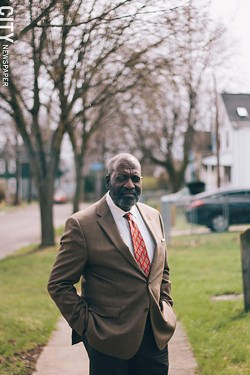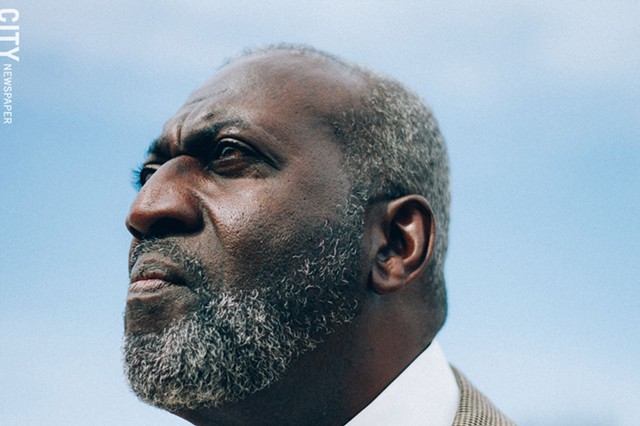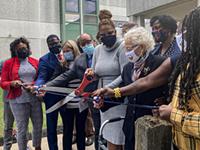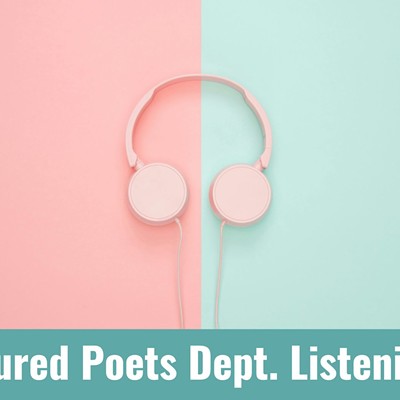
[
{
"name": "500x250 Ad",
"insertPoint": "5",
"component": "15667920",
"parentWrapperClass": "",
"requiredCountToDisplay": "1"
}
]
Almost anyone who has worked in education and human services in Rochester for any length of time knows James Norman, the long-time president and CEO of Action for a Better Community. And few people have developed a better understanding of the area's poverty, the needs of low-income families and children, and the importance of fostering self-sufficiency.
A big man with a quiet demeanor, Norman is retiring at the end of the year, and he says he's looking forward to it. But in a lengthy discussion earlier this month, he was contemplative and at times somber as he discussed his work and the unfinished business of helping Rochester's poor find a way out of poverty.
The statistics on Rochester's poverty rate are daunting: of the nation's top 75 metropolitan areas, we're the fifth poorest city. We're the second poorest among cities of comparable size. We have the third highest concentration of extremely poor neighborhoods. And the Rochester school district is the poorest urban district in the state, with more than 80 percent of its students qualifying for free or subsidized meals.
Norman was frank when he talked about the reasons programs to help the poor get sidelined and funding gets diverted. Too often, he said, the ideological views of those who control the funding are shaded by racism and old, debunked poverty stereotypes.
Ultimately, Norman is asking the Rochester community whether we're willing to accept poverty as "the natural order of things." The peril in that line of thinking is that it relieves us of our moral responsibility, Norman said.
Norman's concern is clearly informed by his personal experience from his career. Before coming to Rochester in the early 1990's, he was an official in the Michigan Department of Labor. At ABC, he has headed an organization of 375 people who provide a wide range of services for Monroe and Ontario counties' low-income children and families, including community development programs, health-education and outreach programs, job preparedness training, and Head Start.
That experience won't go to waste. After retirement, he says, he'll stay in Rochester, and he'll continue his involvement with numerous local non-profits, which means he'll continue to be involved in what has consumed much of his adult life: action on behalf of the poor and the working poor.
Rochester's poverty problem is far more complex than many people understand. And in discussions with James Norman, he makes it clear that a better understanding of the problem will be essential if the community is able to address poverty effectively.
Many of Rochester's poor have jobs, for example, but they don't earn enough to live on. "According to the stats from about two years ago," Norman said, "I believe somewhere around 30 percent of people living in the city who are working regularly fell below the federal poverty level. They're trying to do what they need to do, but if they didn't have access to public support, they would be out on the street."
"We have many citizens who are subsisting on less than half of the federal poverty line," Norman said. "That's severe poverty. So what do these people have in common? Mostly, it's lack of employment, which is usually related to a lack of skills and even a lack of a high school education."
"In poor households," said Norman, "the majority are head by single adults – women-headed households. That's just statistically not a resource-rich environment, because our economy requires that multiple people work in a family.
"If you're a low-income female head of the household, unless your child is of age to get into universal pre-k or our Head Start program, your child-care costs are going to be way beyond your means."
"And there are often issues of substance abuse and other types of health problems," Norman said. "It's easier in poor communities to get a 40-ounce than it is to get fresh fruits and vegetable or any kind of healthy foods."
A widespread stereotype: that the long-term unemployed poor, people whose families have been poor for several generations, are the majority of the poor in Rochester.
"You have a segment of the poor population that is intergenerational poverty," Norman said. "They're a segment of the poor population, but they aren't the majority. They're mainly younger, because their parents had them when they were younger, so the parenting skills that might be possessed by an older, more mature individual often times isn't there."
"The challenge of raising a family in this environment is so great, so strong, that there isn't time for those parents to devote time to their own self-development," Norman said. "Let's say you're a high school dropout: your ability to help your children succeed the way you would like to just isn't possible. And the possibility of that cycle repeating is high."
"Still," Norman said, "there are people who have bought into the myths of poverty: people who just have more children so they get more welfare."
"If you look at the data around intergenerational poverty," Norman said, "that accounts for less than 10 percent of the poor. So we know that isn't true. Sure, there are people on public assistance that could be more productive. But they are the exception, not the rule. It's a small group."
When those "worst examples of abuse" are applied to an entire population of poor people, "that makes it difficult for progressive policies even to be explored on a large scale," Norman said.
"There's also a tendency to think that these people are fundamentally different," he said. "And when you see them as different, you don't treat them as you would yourself. It's easier to put in place policies that are punitive."
The impact of Rochester's poverty is made worse by the fact that it is concentrated in a few neighborhoods. And that's not by accident, Norman noted. It started with the development of the suburbs after World War II.
"For many years," he said, "there wasn't the option for certain groups of people to move into them" – and those "certain groups" were African Americans. For them, Norman said, "housing options only existed within the city of Rochester and only in certain parts of the city."
"The pattern of discrimination was so embedded," Norman said, "that even when the Fair Housing law was put into place, it didn't result in an immediate change in people's practices.
"The Empire Justice Center only about 10 to 15 years ago had a HUD contract to do testing. They would send two sets of people out with similar education and similar employment background to apply for rental housing. It was found that places that might have been available to a white couple almost immediately were not available to black and brown couples."
Also restricting housing options for the poor, and thus concentrating the county's poor in the city: "The distribution of Section 8 is concentrated in the city," said Norman. "That means that if you're a lower-income individual, your options are limited, and the city is the place where you can live. Because of housing patterns and because of the prevalence of discrimination, you end up with the majority of poor African-American and Latinos living in the city."
Rochester has one of the highest childhood poverty rates in the country, and the majority of these children are children of color. Where is the outrage?
"It's a fascinating question," Norman said, "and I ask myself the same thing with respect to mass incarceration. I believe generations in the future are going to wonder what the hell we were thinking."
"There isn't widespread outrage among a lot of people," he said, "because they have rationalized that this is the natural order of things, and you can't do anything about the natural order of things."
"People who are not born into that situation are often not inclined to change it," Norman said. "They don't see how it impacts them; it's not their child."
"Where is the wealth concentrated? It's concentrated in an older European population," Norman said. "Where is the poverty concentrated? It's concentrated in a younger black and brown population. There's no connection, no sense of responsibility to their poorer brothers and sisters."
It's not that Rochester has ignored its rising poverty rate. Media files and agency bookshelves are full of articles and reports. And, as Norman noted, there've been multiple initiatives designed to deal with poverty and its impact: New Ventures, Goals for a Greater Rochester, the Children's Zone. But those initiatives weren't sustained.
"And now we're doing RMAPI" – the Rochester-Monroe Anti-Poverty Initiative. "The jury is still out on that one," said Norman. "It's barely two years old, and it was designed to be a 15-year initiative."
But there have also been problems, locally and nationally, with broader initiatives.
"Throughout my entire career over four decades," Norman said, "we've been ambivalent about how we effectively help people off the [public assistance] system and transition to independence.
"You have this conflict between punishment and incentives. The punishment side comes to this from the perspective that if you give people too much help, it diminishes their drive to look for work and become independent. It diminishes their initiative. So to avoid that problem, you place sometimes unrealistic demands upon those individuals."
The "benefits cliff" is an example. "If someone is on the system and they have an incremental improvement in their personal economic situation, it triggers a rather immediate impact on the amount of assistance they can get. I may not be working, and then I get a job, and I report that, and it impacts my benefits."
And if that job ends? The working poor are often forced to choose between two bad options: "endure the struggles while they try to advance," Norman said, or just throw up their hands and stay on public assistance.
"They need a transition period," said Norman, something that will let them become stable. "We don't want them to get into a worse situation," Norman said, "but this is often the case for the underemployed or chronically unemployed."
Another problem: the actions we take to reduce poverty are often based not on how effective they are but on political philosophy.
"You may have some really good programs that are producing results," Norman said, "but because they don't fit into someone's philosophical spectrum, the program may not be continued. Funding may dry up or be diverted to some other program."
As an example of the influence of different perspectives: In 2015 the City of Rochester passed "Ban the Box" legislation, which prohibits many employers from asking job applicants up front whether they have a criminal history. The county didn't pass a similar legislation, however. The result: two different policies exist in the same community because of "political orientation," said Norman, "not because it's a good or bad policy."
Wages are also a major problem, and "even in a progressive state like New York," Norman notes, the minimum wage simply sustains people at a "working-poor" level.
"So now we have people who are working full-time and multiple part-time jobs," said Norman "and the combination of those wages doesn't put them in a position that's sustainable. They have to depend on things like housing subsidies and food stamps in order to get by."
"It is interesting that in this most recent debate about the Affordable Care Act," Norman said, "in addition to hospital and pharmaceutical associations and insurance companies being opposed to the proposed [Republican] plan, some big employers like Walmart said, 'Hey, wait a minute, our people depend on that.' It takes some of the pressure off of them when they know that their employees can access some of these public benefits."
"I personally feel that if you have a business and you can't afford to pay people a living wage, that's not good," Norman said. "Profits to me come second. Fairness to your workers comes first. I don't begrudge entrepreneurs or people in businesses making a profit. Reward shareholders, but a balance has to be reached.
"Henry Ford upset a lot of his fellow automakers when he decided that people who work for him should be able to afford the cars they're making."
Related to the wage problem are the changes in Rochester industries, which have been especially hard on the poor. "If you look at employment," Norman said, "we've had some setbacks because of globalization and automation. People who didn't have an advanced education or strong skills don't have the same level of opportunities today that they had when Kodak, Xerox, and Bausch and Lomb were stronger."
"That ability to go and get a good-paying job straight out of high school was fading as I was taking over ABC," he said. "And I would say we still haven't yet made the transition to provide the kind of retraining that equips the population of today for the jobs that will be available tomorrow. That's a transformation process that we're still in."
Rochester's biggest priority in addressing poverty has to be improving Rochester's public schools, Norman said. Most of the Rochester school district's students are poor, and most of them are African American or Hispanic. The district's graduation rate is only 47.5 percent. And as Norman noted, many of the students who do graduate aren't qualified to get into college or get a job.
"So we're not preparing this generation to take advantage of current opportunities," Norman said. "And that's a really big concern, because it impacts our whole social and economic system. It impacts the number of people that have to go to look for public assistance and the number of people who are on unemployment."
"It starts with public education," he said, "because that is impacting everything else. So how do you do that?"
"The wish-list solution," he said, "would be a countywide school system." But given the way New York State's school districts are structured, he said, that's not likely. So we'll have to improve the system we have. And Norman can cite plenty of areas needing improvement.
"The reality is that you have a system with the district that is predominantly black and brown and a teaching staff that is predominantly white. The results that we're getting indicate that there needs to be an intervention in the present situation in order to improve outcomes.
"One solution might be to make the teaching staff more reflective of the student population. But again, you just can't dictate that, because of employment laws and union regulations.
"But you can try to improve cultural competence. And you can address a problem that exists nationwide and provide a curriculum that is more inclusive and more extensive than the current curriculum, which is mostly a Eurocentric curriculum. This fails to recognize the achievements of all people in this country as they actually occurred."
As a result, Norman said, students get the message that all the good accomplishments that have happened in the history of this country "were achieved by people who don't look like them."
Norman applauds the work of the Rochester school district's School Climate Task Force, which called for changes in curriculum and which also focused on discrimination in the district's suspension of students. He applauds the district for adopting the Code of Conduct policy in response to the task force recommendations. The policy addresses student behavior and the appropriate responses to it.
And, he said: "The city school board's support of Professor Joy DeGruy's model of teaching and relating to students is another step in the right direction. Connected to that is a culturally responsive curriculum that could also be referred to as an anti-racism curriculum."
DeGruy, an author, lecturer, and educator, argues that slavery, followed by decades of racism and deliberate discrimination, continues to have a profound impact on African Americans today. And she stresses the need for teachers to better understand and respect the diversity and culture of their students.
Norman also supports charter schools – "as long as they follow the rules and don't push out the students that are most challenging" – because, he says, the school district "needs that kind of competition."
"If I had a child that was school age," he said, "I would certainly look for the best alternative. And if there was a school that seemed to be better and it happened to be a charter school, I would choose it. People deserve to have that choice."
Housing, employment opportunities, education: the poor suffer in all of these areas, and the roots of that struggle are found in a history of racism. Poverty, Norman emphasizes, is intrinsically linked to racism.
"The fact is that you have a population of people that have been discriminated against based on their appearance," Norman said. "Racism denies certain groups and rewards others. If you don't deal with issues of discrimination and you try to deal only with poverty, you're overlooking the elephant in the room."
"It makes people uncomfortable to talk about it," Norman said. "It's like: 'Why you got to talk about race all the time?' But certain facts are undeniable: In the 21st century, we're not more than a couple of generations away from forced segregation. Housing discrimination was just the way things were. From the 1930's to 1959, a lot of our communities were structured in a discriminatory fashion.
"We're still living with that, and that's just a fact."
"You're not going to do away with prejudice and racism," Norman said, "but you can dismantle policies and practices that promote the ideology of the other and separateness. If we are going to fight poverty and we don't pay attention to the embedded discrimination in our society, then we're missing a big part of what we have to address to succeed."
Speaking of...
Latest in News
More by Tim Louis Macaluso
-

RCSD financial crisis builds
Sep 23, 2019 -

RCSD facing spending concerns
Sep 20, 2019 -

Education forum tomorrow night for downtown residents
Sep 17, 2019 - More »










